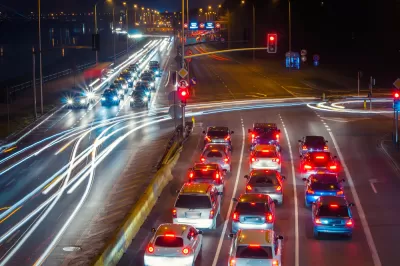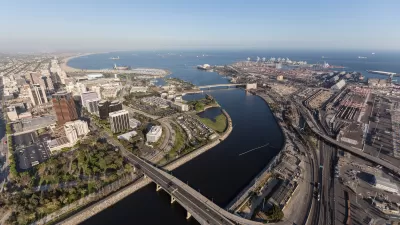Hyperloops and wider highways don't shrink commute times, the real factor in how long people will drive is how long people are willing to drive.

The Hyperloop is a compelling idea, and it has led to a lot of expansive thinking about the future of life and transit, but it's not going to shorten the average American commute, according to the case made by Emily Badger in the New York Times. Even if the Hyperloop ever does get built (a big if) it's unlikely to change the length of the average American commute or even the commute of the town in which it gets built. Because more infrastructure doesn't mean shorter commutes, and it never has.
Commute times have held relatively steadily across time and geography. "Of course plenty of workers trek less or much more, but average American commute times have budged only modestly over the last 35 years, since the census began asking about them," Emily Badger writes. She goes on to point out average commute times around the globe generally sit close to this number as well. None of this is to say changes in travel infrastructure can't change people's lives. They may make us safer, change the places we live, work and entertain ourselves. Even if the Hyperloop comes to fruition, which Badger calls a "wild hypothetical," it won't change the length of our average commutes.
FULL STORY: Why Even the Hyperloop Probably Wouldn't Change Your Commute Time

Planetizen Federal Action Tracker
A weekly monitor of how Trump’s orders and actions are impacting planners and planning in America.

San Francisco's School District Spent $105M To Build Affordable Housing for Teachers — And That's Just the Beginning
SFUSD joins a growing list of school districts using their land holdings to address housing affordability challenges faced by their own employees.

Can We Please Give Communities the Design They Deserve?
Often an afterthought, graphic design impacts everything from how we navigate a city to how we feel about it. One designer argues: the people deserve better.

The EV “Charging Divide” Plaguing Rural America
With “the deck stacked” against rural areas, will the great electric American road trip ever be a reality?

Judge Halts Brooklyn Bike Lane Removal
Lawyers must prove the city was not acting “arbitrarily, capriciously, and illegally” in ordering the hasty removal.

Engineers Gave America's Roads an Almost Failing Grade — Why Aren't We Fixing Them?
With over a trillion dollars spent on roads that are still falling apart, advocates propose a new “fix it first” framework.
Urban Design for Planners 1: Software Tools
This six-course series explores essential urban design concepts using open source software and equips planners with the tools they need to participate fully in the urban design process.
Planning for Universal Design
Learn the tools for implementing Universal Design in planning regulations.
Borough of Carlisle
Smith Gee Studio
City of Camden Redevelopment Agency
City of Astoria
Transportation Research & Education Center (TREC) at Portland State University
City of Camden Redevelopment Agency
Municipality of Princeton (NJ)





























